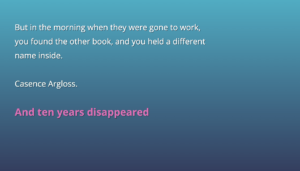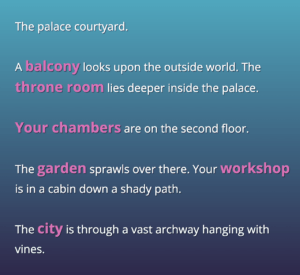I played the game “with those we love alive”. It is a Twine game developed by Porpentine. Twine is an open source tool used to tell interactive stories. The game is available online on the internet (free of cost). The game required patience and was not fast paced like a lot of games we see around us — due to this, I believe it is intended for a more mature audience and those who enjoy fantasy stories (ages 14+ perhaps).

To me, playing this game as a feminist meant:
- Seeing representation of colors like pink in games as well as a narrative that was not centered around masculinity (this is probably the first time I had seen that in an online game) and this is what was brought up in the reading by Shira — people telling her that “I never knew something like this existed”.
- At the starting of the game, the players are told to have a marker nearby that they can use to write on their body and that was very surprising — it made the narrative personal for the players. For me, this mechanic allowed for the dynamic of me following the story closely and drawing on my arm which led to the aesthetic of sensation and narrative. I, however, do wish there was a little more direction provided for this to guide players who did not fully grasp the concept as I was quite lost initially.
- The immersive and interactive choose your own adventure storytelling allows one to relate to the protagonist and develop an attachment to the story. It also empowers the player. It was not just about gender and class, but it created a dialogue around many more things that are not really fully represented in the world of games at the moment. Exploring the “world” at my own pace and seeing new information (pink highlighted text) come to life for me to explore, being able to step away from the active narrative by going to sleep or meditating, and having the option to look away — i.e having agency — was liberating. These mechanics lead to the dynamic of feeling empowered, making decisions (and not worrying if I was wrong) and being engulfed in the story. This lead to the aesthetic of fantasy and discovery.

I think the game does a great job at inviting in new ideologies as well as stabilising and disrupting. This game was not fast paced and time bound like most other games we see around us and it required patience — a great way to pull in feminist players.
But as a player, I did not enjoy it as much as I have enjoyed the other games I have played for this class. I feel this is because the game felt a little too open ended — at some points I would have appreciated some sort of hint mechanism to move forward or perhaps an indication of what my goal is. I feel this also ties back to how the reading mentions that we need to break away from our perceived notions of what games are. Would I have enjoyed this game more had I been exposed to similar ones in the past? I think yes. And that is what we need to change.
I also feel the game could include some conversational aspects that would help enhance the emotional affect.

Discussion question – As a player, I did not enjoy this game much because I had not played anything like this before. I would have probably liked it had I played something like this before. How do we solve this problem?


